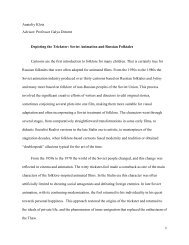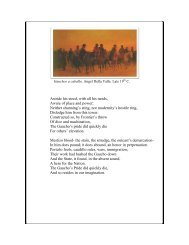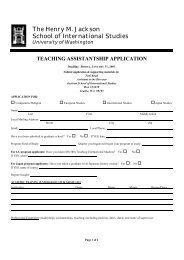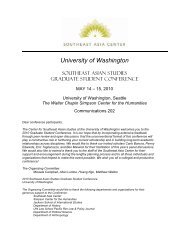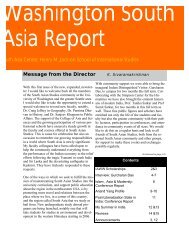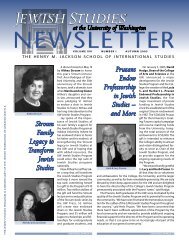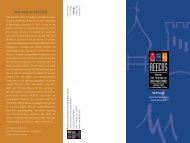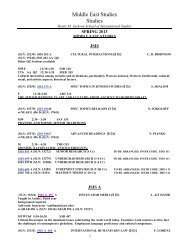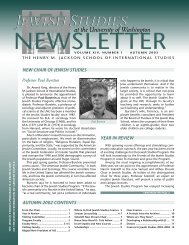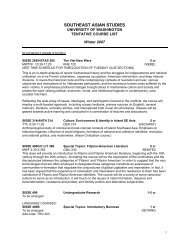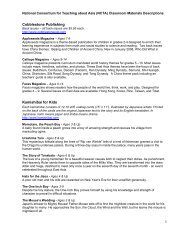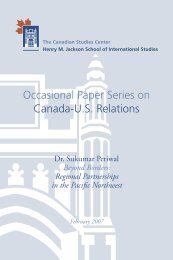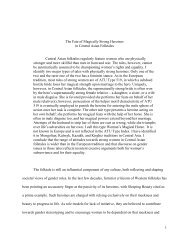JSIS STUDENT SERVICES - Jackson School of International ...
JSIS STUDENT SERVICES - Jackson School of International ...
JSIS STUDENT SERVICES - Jackson School of International ...
You also want an ePaper? Increase the reach of your titles
YUMPU automatically turns print PDFs into web optimized ePapers that Google loves.
<strong>STUDENT</strong> <strong>SERVICES</strong> BULLETIN Page 11<br />
Korea Studies Program Program:<br />
: Recent Events<br />
On December 2nd, the Center for Korea Studies held a book launch party for this new publication, which follows Pr<strong>of</strong>essor<br />
Hwasook Nam's Building Ships, Building a Nation, which was published in 2009. The Center was honored to have former UW<br />
Pr<strong>of</strong>essor James Palais's wife Jane Palais, as well as Senator Paull Shin and Ick-whan Lee, two very prominent Korean-American<br />
community members, attend the event.<br />
Extra! Extra! Read All About It! Center for Korea Studies Publications a HIT!<br />
Reassessing the Park Chung Hee Era, The Journal <strong>of</strong> Korean Studies,<br />
and “Unsettling the National in Korean Cinema”<br />
By Tracy Stober, Managing Editor<br />
For the first time in Center for Korean Studies (CKS) history three<br />
publications hit the press in the same year. In October, Reassessing<br />
the Park Chung Hee Era 96 - 979 Development, Political Thought,<br />
Democrac , and Cultural Influence edited by Hyung-A Kim and UW<br />
pr<strong>of</strong>essor Clark W. Sorensen became the second volume in the CKS<br />
Publication Series. This timely text details one <strong>of</strong> the most turbulent<br />
eras in South Korean history. Historic changes, for example the<br />
transformation from an underdeveloped, agrarian country into the<br />
“miracle on the Han River” began under President Park, who seized<br />
power through a military coup and ruled until his assassination. This<br />
book examines the rationale and ideals behind Park’s philosophy <strong>of</strong><br />
national development in order to evaluate the degree to which the<br />
national character and moral values were reconstructed. In December<br />
the CKS hosted a book launch and celebration party. It was well<br />
attended. In addition to <strong>JSIS</strong> faculty, staff, and students several community members joined in including Mrs. Jane Palais, Senator<br />
Paull Shin, and community fundraiser Mr. Ikwhan Lee.<br />
Again in December 2011, The Journal <strong>of</strong> Korean Studies (JKS) published its first thematic issue “Unsettling the National in Korean<br />
Cinema” guest edited by JungBong Choi (New York University). Numerous films set the stage for this issue, including silent flicks<br />
and “talkies,” films from the colonial period, the martial art blockbuster <strong>of</strong> the 1970s, Five Fingers <strong>of</strong> Death, and movies up until<br />
the end <strong>of</strong> the first decade <strong>of</strong> the 2000s (Housewife, Thirst, etc). In total over 80 films were discussed in this issue. Authors include:<br />
JungBong Choi, Steven Chung (Princeton), Roald Maliangkay (Australian National University) Kyung Hyun Kim (UC-Irvine),<br />
Aaron Han Joon Magnan-Park (University <strong>of</strong> Notre Dame), and Soyoung Kim (Korean National University <strong>of</strong> Arts).<br />
In June, our regular, varied topic issue was published. Article topics include colonial rule era marketing and the press, North Korean<br />
propaganda, political uses <strong>of</strong> Confucianism, pre-college study abroad programs in South Korea, and Silla period images from<br />
the Buddha Valley on Mount Nam. Aauthors include: Mark E. Caprio (Rikkyo University, Tokyo); Tatiana Gabroussenko<br />
(Australian National University); Jin Woong Kang (University Of Minnesota); Jiyeon Kang (University <strong>of</strong> Iowa), and Nancy Abelmann<br />
(University <strong>of</strong> Illinois-Champaign/Urbana).<br />
In addition to a selection <strong>of</strong> articles, each issue includes media reviews. In 2011 the following film and books were reviewed: The<br />
Past Is a Strange Countr (Kwagŏ nŭn nassŏn narada) (film); Gender and Mission Encounters in Korea New Women, Old Wa s;<br />
Japanese Assimilation Policies in Colonial Korea, 9 – 9 5;Witness to Transformation Refugee Insights into North Korea; Inside<br />
the Red Box North Korea’s Post-totalitarian Politics, The Hidden People <strong>of</strong> North Korea Ever da Life in the Hermit Kingdom;<br />
Horror to the Extreme Changing Boundaries in Asian Cinema; A Dragon’s Head and a Serpent’s Tail Ming China and the<br />
First Great East Asian War, 592– 598; and South Koreans in the De t Crisis The Creation <strong>of</strong> a Neoli eral Welfare Societ .<br />
Book Excerpt:<br />
"The top-down industrialization through the Park state’s guided econom ecame known as the “Miracle on the Han River,”<br />
(Hangang ŭi k ŏk) and was admired man political leaders in the region, including Deng Xiao Ping in China and Mahathir<br />
in Mala sia, who oth adopted the Korean model <strong>of</strong> development for their own countries. <strong>International</strong> recognition <strong>of</strong> the ROK’s<br />
successful economic development, however, did little to mollif Park’s domestic critics. Although the success <strong>of</strong> the ROK’s econom<br />
and democrac must, in its final anal sis, e considered as a collective outcome <strong>of</strong> the efforts <strong>of</strong> all Koreans, the South Korean<br />
case serves as a protot pe for the Asian developmental model, with the defining feature <strong>of</strong> detailed intervention in manpower<br />
planning, particularl in the state’s implementation <strong>of</strong> the Heav and Chemical Industrialization Plan launched in Januar 973."<br />
For updates visit the Center for Korea Studies website: http://jsis.washington.edu/korea/<br />
You can also follow The Journal <strong>of</strong> Korean Studies on Facebook and Twitter.<br />
Our facebook link: http://www.facebook.com/pages/The-Journal-<strong>of</strong>-Korean-Studies/302074140679<br />
Our Twitter link: http://twitter.com/journalkorea<br />
Submitted by -- Chris Buchman



